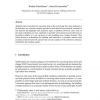Free Online Productivity Tools
i2Speak
i2Symbol
i2OCR
iTex2Img
iWeb2Print
iWeb2Shot
i2Type
iPdf2Split
iPdf2Merge
i2Bopomofo
i2Arabic
i2Style
i2Image
i2PDF
iLatex2Rtf
Sci2ools
AI
2004
Springer
2004
Springer
Elaboration tolerance through object-orientation
Although many formalisms for reasoning about action and change have been proposed in the literature, any concrete examples provided in such articles have primarily consisted of tiny domains that highlight some particular aspect or problem. However, since some of the classical problems are now completely or partially solved and since powerful tools are becoming available, it is now necessary to start modeling more complex domains. This article presents a methodology for handling such domains in a systematic manner using an object-oriented framework and provides several examples of the elaboration tolerance exhibited by the resulting models.
Related Content
| Added | 16 Dec 2010 |
| Updated | 16 Dec 2010 |
| Type | Journal |
| Year | 2004 |
| Where | AI |
| Authors | Joakim Gustafsson, Jonas Kvarnström |
Comments (0)

